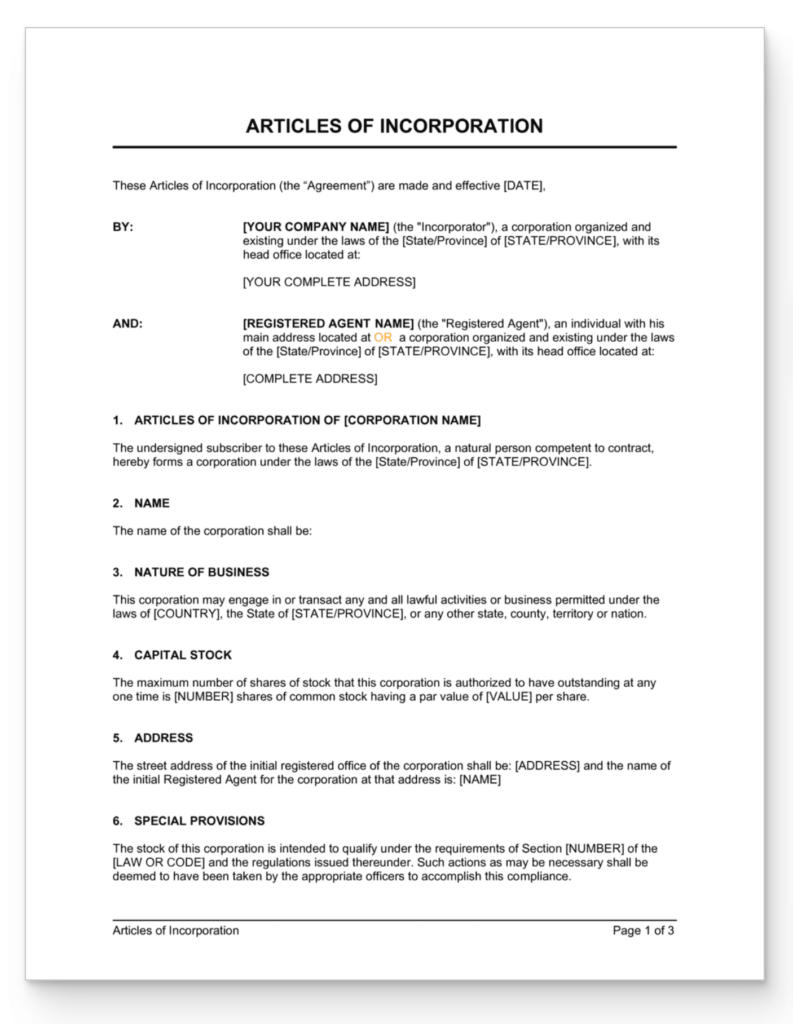Articles of Incorporation Example: What’s Included?
Are you and your team ready to form a new corporation? There are many things to consider, but the first step you must take is filing your company’s Articles of Incorporation before you do anything else. They’ll let you open bank accounts, issue shares, and more.
Here’s what every business owner in the US should know about Articles of Incorporation:
What Are Articles of Incorporation?
Articles of incorporation, also called Certificate of Charter, are the legal documents you file with the state government to form a new corporation. They are relatively simple documents to create and require you to provide some information about your proposed company, including contact information, business name, and shares issued.
You may also see Articles of Incorporation referred to as:
- Articles of Association
- Certificate of Incorporation
- Corporate Charter
Articles of incorporation aren’t company bylaws. Bylaws work in tandem with your Articles of Incorporation to form the basic legal structure of operation. However, you don’t have to file your bylaws with the government.
Article of Incorporation Examples
Here’s an example of how Articles of Incorporation work:
Let’s say that you want to form a corporation in Delaware called the “ABC Corporation.” You must file your Articles of Incorporation before you can open a bank account, solicit investors, issue stocks, or engage in other transactions. After filing and registering Articles of Incorporation with the Secretary of State’s office, you will receive an official certificate that indicates you are permitted to operate as a corporation within the state.
Below is an example of publicly available Articles of Incorporation pulled from the SEC database.
ARTICLES OF INCORPORATION OF MERCHANDISE CREATIONS, INC.
KNOW ALL MEN BY THESE PRESENTS: That the undersigned, has this day voluntarily executed these Articles of Incorporation for the purpose of forming a corporation under the laws of the state of Nevada, and to that end, I do hereby certify:
ARTICLE 1 – NAME
The complete name of this corporation shall be MERCHANDISE CREATIONS, INC.
ARTICLE II – REGISTERED AGENT AND PRINCIPAL OFFICE
The registered agent and principal office the corporation, in the state of Nevada, shall be as follows: The registered agent in charge thereof is Savoy Financial Group, Inc, located at 6767 W. Tropicana Ave., Suite 207, in the City of Las Vegas, Nevada, 89103, County of Clark.
ARTICLE III – DURATION
The duration of this corporation shall be perpetual.
ARTICLE IV – PURPOSES
The purposes for which this corporation is organized are as follows: To engage in any lawful act or activity for which a corporation may be organized under the general corporation laws of Nevada. Including but not limited to the following:
a) Shall have such rights, privileges, and powers as may be conferred upon corporations by any existing law.
b) May at any time exercise such rights, privileges, and powers, when not inconsistent with the purposes and objects for which this corporation is organized.
c) Shall have the power to have succession by its corporate name for the period limited in its certificate or articles of incorporation, and when no period is limited, perpetually, or until dissolved and its affairs wound up according to law.
d) Shall have the power to sue and be sued in any court of law or equity.
e) Shall have the power to make contracts.
f) Shall have power to hold, purchase and convey real and personal estate and to mortgage or lease any such: real and personal estate with its franchises. The power to hold real and personal estate shall include the power to take the same by devise or bequest in the State of Nevada, or in any other state, territory, or country.
g) Shall have the power to appoint such officers and agents, as the affairs of the corporation shall require, and to allow them suitable compensation.
h) Shall have the power to make By-Laws not inconsistent with the constitution or laws of the United States, or of the State of Nevada, for the management, regulation, and government of its affairs and property, the transfer of its stock, the transaction of its business, and the calling and holding of meetings of its stockholders.
i) Shall have the power to wind up and dissolve itself or be wound up or dissolved.
j) Shall have the power to adopt and use a common seal or stamp, and alter the same at pleasure. The use of a seal or stamp by the corporation on any corporate documents is not necessary. The corporation may use a seal or stamp if it desires, but such use or non-use shall not in any way affect the legality of the document.
k) Shall have power to borrow money and contract debts when necessary for the transaction of its business, or for the exercise of its corporate rights, privileges, or franchises, or for any other lawful purpose of its incorporation; to issue bonds, promissory notes, bills of exchange, debentures, and other obligations and evidence of indebtedness, payable at a specified time or times, or payable upon the happening of a specified event or events, whether secured by a mortgage, pledge or otherwise, or unsecured, for money borrowed, or in payment for property purchased, or acquired, or for any other lawful object.
l) Shall have power to guarantee, purchase, hold, sell, assign, transfer, mortgage, pledge or otherwise dispose of the shares of the capital stock of, or any bonds, securities, or evidence of the indebtedness created by, any other corporation or corporations of the State of Nevada, or any other state or government, and, while owners of such stock, bonds, securities or evidence of indebtedness, to exercise all the rights, powers and privileges of ownership, including the right to vote if any.
m) Shall have the power to purchase, hold, sell and transfer shares of its own capital stock, and use therefore its capital, capital surplus, surplus, or other property or fund.
n) Shall have the power to hold meetings and keep the books, documents, and papers outside of the State of Nevada at such places as may be from time to time designated by the Bylaws or by resolution of the directors except as otherwise required by the laws of Nevada. To conduct business, have one or more offices, and hold, purchase, mortgage, and convey real and personal property in the State of Nevada, and in any of the several states, territories, possessions, and dependencies of the United States, the District of Columbia, and any foreign countries.
o) Shall have power to do all and everything necessary and proper for the accomplishments of the objects enumerated in its certificate or articles of incorporation, or any amendment thereof, or necessary or incidental to the protection and benefit of the corporation and, in general, to carry on any lawful business necessary or incidental to the attainment of the objects of the corporation, whether or not such business is similar in nature to the objects set forth in the certificate or articles of incorporation of the corporation, or any amendment thereof.
p) Shall have the power to make donations for the public welfare or for charitable, scientific, or educational purposes. q) Shall have power to enter into partnerships, general or limited, or joint ventures, in connection with any lawful activities, as may be allowed by law.
ARTICLE V – SHARES
This corporation is authorized to issue one class of capital stock to be designated “Common Stock.” The total number of shares of common stock that this Corporation is authorized to issue is One Hundred Million (100,000,000) shares of Common Stock having a par value of $0.001 each share. The holders of the Common Stock shall have one (1) vote per share on each matter submitted to a vote of shareholders. Each share shall be entitled to the same dividend and liquidation rights. The capital stock of this corporation, after the amount of the subscription price has been paid in, shall never be assessable, or assessed to pay debts of this corporation.
ARTICLE VI – PREEMPTIVE RIGHTS
No preemptive rights, as that term is defined under NRS 78.265, shall exist with respect to shares of stock or securities convertible into shares of stock of this corporation.
ARTICLE VII – CUMULATIVE VOTING
The shareholders of this corporation shall not be entitled to cumulative voting at the election of any directors.
ARTICLE VIII – DIRECTORS
The members of the governing board of this Corporation shall be styled directors and the number thereof at the inception, of this Corporation, shall be one (1). The director(s) need not be shareholders of this Corporation, nor residents of the State of Nevada. The number of directors may from time to time be increased or decreased in such manner as shall be provided for by the bylaws of the Corporation. The name and post office address of the person who is to serve as the initial director until the first annual meeting of the shareholders of the corporation, or until her successors are duly elected and qualified is as follows: Name Address Robert Turner 4704 Towne Square Drive #2626 Plano, TX 75024
ARTICLE IX – CONTRACTS IN WHICH DIRECTORS HAVE AN INTEREST
Any contract or other transaction between this corporation and one or more of its directors, or between this corporation and any corporation, firm, association, or other entity, of which one or more of this corporation’s directors are shareholders, members, directors, officers or employees or in which they are interested, shall be valid for all purposes, notwithstanding the presence of such director or directors at the meeting of the Board of Directors which acts upon or in reference to such contract or transaction and notwithstanding the participation of such director or directors in such actions, by voting or otherwise, even though the presence or vote, or both, of such director or directors, might have been necessary to obligate this corporation upon such contract or transaction; provided, that the fact of such interest shall be disclosed to or known by the directors acting on such, contract or transaction.
ARTICLE X – INDEMNIFICATION
1. A director of this corporation shall not be personally liable to the corporation or its shareholders for monetary damages for conduct as a director, except for liability of the director (i) for acts or omissions that involve intentional misconduct by the director or a knowing violation of law by the director, (ii) for conduct violating the Nevada Revised Statutes, or (iii) for any transaction from which the director will personally receive a benefit in money, property or services to which the director is not legally entitled. If the Nevada Revised Statutes are amended in the future to authorize corporate action further eliminating or limiting the personal liability of directors, then the liability of a director 4 of this corporation shall be eliminated or limited to the full extent permitted by the Nevada Revised Statutes, as so amended, without any requirement of further action by the shareholders.
2. The corporation shall indemnify any individual made a party to a proceeding because that individual is or was a director of the corporation and shall advance or reimburse the reasonable expenses incurred by the individual in advance of final disposition of the proceeding, without regard to the limitations in Nevada Revised Statute 78.7502, or any other limitation which may hereafter be enacted, to the extent such limitation may be disregarded if authorized by the Articles of Incorporation, to the full extent and under all circumstances permitted by applicable law.
3. Any repeal or modification of this Article by the shareholders of this corporation shall not adversely affect any right or any individual who is or was a director of the corporation which existed at the time of such repeal or modification.
ARTICLE XI – RIGHT TO AMEND ARTICLES OF INCORPORATION
This corporation reserves the right to amend or repeal any of the provisions contained in its Articles of Incorporation in any manner now or hereafter permitted by law, and the rights of the shareholders of this corporation are granted subject to this reservation.
ARTICLE XII – BYLAWS
The Board of Directors shall have the power to adopt, amend, or repeal the bylaws of this corporation, subject to the power of the shareholders to amend or repeal such bylaws. The shareholders shall also have the power to adopt, amend or repeal the bylaws of this corporation.
ARTICLE XIII – INCORPORATOR
The name and address of the incorporator signing these articles of incorporation were as follows:
Name, Address
See Business in a Box: Incorporation Templates Kit
How Do I Write Articles of Incorporation?
Writing Articles of Incorporation is a fairly straightforward process. Your Secretary of State’s office, or the state in which you are incorporating, should have a form available online that you complete and return with a filing fee. The challenging part is filling out the form correctly so that it doesn’t result in unintended legal consequences.
Take the following steps when writing your organization’s Articles of Incorporation:
Step 1. Visit Your Secretary of State’s Website
Start by searching for your Secretary of State’s office online. Navigate to the website and locate the proper form. If you have legal questions about which form to use, speak with corporate lawyers to guide you through the process or leverage.
See Business in a Box: LLC Templates Kit
Step 2. Complete the Information as Requested
Articles of Incorporation will always vary from state to state. However, they all primarily request the same types of information.
You must be able to provide the following to file your Articles of Incorporation:
- Corporation name and mailing address
- Registered agent name and address
- Duration of incorporation
- Nature of the business
- Number of shares and type issued
- Powers of Incorporation designations
- Signature and date lines
Your provided answers will influence your corporation’s legal future and financial standing. Meet with your legal team and board to determine how you should structure your corporation.
Step 3. Obtain a Check for the Filing Fee
All states charge a filing fee to incorporate a business within the state, regardless of whether operations physically take place there. Filing fees are relatively nominal, but the cost will vary from state to state. For example, incorporating in Oklahoma will cost you $50, whereas Massachusetts charges $400.
Step 4. Submit Your Articles of Incorporation as Instructed
After signing the form, you’re ready to submit your Articles of Incorporation to the Secretary of State’s office for processing. Most offices allow you to file them in person, by email and mail, or by fax. You can also send a self-addressed stamped envelope (SASE) to receive a return receipt.
It could take 30 and 60 days to receive a response and confirmation. However, some states allow for expedited processing for an additional fee. Inquire with their office if you’re crunched for time and don’t mind paying a little extra money for speed.
Step 5. Begin Operating
After you receive an official certificate, your corporation is now legally permitted to operate in the state. Retain copies of all documents and provide them upon request to financial institutions and investors if you need to prove your company’s existence.
What Is Included In Articles of Incorporation?
Articles of Incorporation are relatively short when compared with lengthy contracts. The good news is that the state government generally provides forms, which means it’s easy to include everything you need.
The following elements are generally included in Articles of Incorporation:
Element 1. Corporation Name and Address
Start by sharing the name of your corporation. Avoid adding a Doing Business As (DBA) designation unless otherwise requested to do so. Also, list the corporation’s primary headquarters address.
Element 2. Registered Agent Name And Address
The registered agent is someone you choose to list publicly on file with the Secretary of State’s office. You can use your name, the name of another corporation, or a registered agent company. This address is used for third-party contact.
Element 3. Duration of Incorporation
The state also wants to know how long you plan to operate. It’s perfectly acceptable to say, “Perpetual” if you plan to operate the company indefinitely. Otherwise, supply a date by which the corporation should terminate.
Element 4. Nature of the Business
For economic purposes, you should also let the state know the nature of your business. If you’re forming a construction company, then you can write down “Construction supply and building” or some variation thereof. The only requirement for this section is that you supply a lawful and legitimate business purpose.
Element 5. Number of Shares and Type Issued
What makes corporations unique is their ability to offer stocks to investors as a way of raising capital. Many Articles of Incorporation forms will ask you to indicate how many shares you’re issuing, whether they’re common or preferred, series, and par value per share.
Element 6. Powers of Incorporation Designations
If you want the powers of an incorporator to terminate upon the filing of your Articles of Incorporation, then you should complete this section as well. The state will issue a notice to the incorporators that their powers of terminated.
Finally, don’t forget that all members should sign and date the document. You should also pay the filing fee upon submitting the document to your Secretary of State’s office.
While Articles of Incorporation are short, template documents, it doesn’t mean that they are easy to complete. The information you provide can affect your company indefinitely or result in unwanted legal issues. Seek immediate legal advice if you have questions related to your specific situation.
See Business in a Box: Trademark License Agreement Template.
When Do You Need Articles of Incorporation?
You need Articles of Incorporation when creating a corporate business formation, including a C-Corp or S-Corp. Articles of Incorporation are also essential for setting up a bank account, obtaining capital, and establishing a legal identity for your company. Doing so also separates your personal assets from the corporation’s finances.
Do LLCs Have Articles of Incorporation?
No, LLCs don’t have Articles of Incorporation. Instead, they use Articles of Organization. A form to file with the state government department is generally available online through your Secretary of State’s Office.
Get Legal Help with Articles of Incorporation
In conclusion, Articles of Incorporation are the legal documents that form your company’s existence. It’s essential that you get them right and consider your future needs. Corporate lawyers in your state can prepare and submit Articles of Incorporation on your company’s behalf while providing insightful legal advice along the way.
Business in a Box is here to help with all your new business legal documents. Download your Articles of Incorporation ready to fill now!
There’s no need to recreate the wheel when it is possible to create much of what you need to succeed by simply customizing the resources discussed above — and more — from Business in a Box. Save time, money, and angst by going to the best source for legal resources!
Source: contractscounsel.com
























